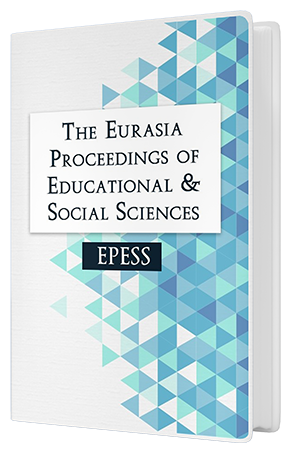ANALYSIS OF SCIENCE TEACHER CANDIDATES’ ATTITUDES, BEHAVIOR AND SELF-EFFICACY TOWARDS RENEWABLE ENERGY AND ENVIRONMENT
Keywords:
Science education, environment, renewable energy, attitude, behavior, self-efficacyAbstract
In this study, it is aimed to analyze attitudes, behavior and self-efficacy levels of science teacher candidates towards renewable energy and environment. The study is conducted over three research questions. These are, “Is there a significant difference among pre-test, post-test and retention-test scores of science teacher candidates regarding environmental behavior and environmental self-efficacy?” Participants of this study consist of 37 science teacher candidates, who applied to the project titled as ‘Environment and Energy with Pro-Fe(Science)ssional Education’ held between the dates 17th-23rd June, 2014. Pre-test, post-test and retention-test of renewable energy, environmental behavior and environmental self-efficacy are used to determine changes in attitudes, behaviour and self-efficacy of Science teacher candidates towards these variables. The scales used as data collection tools are respectively, “Environmental Behavior”, “Renewable Energy Attitude” and “Self-Efficacy Beliefs through Environmental Education”. In the light of findings obtained from data, post-test scores are found to be higher than pre-test scores and retention-test scores are observed to be lower compared to post-tests. According to analysis of variance and Bonferroni multiple comparison test, statistically significant difference is found between post test - retention test and pre-test scores. When the obtained results are considered, it is concluded that 8-day-nature education makes a major contribution to the participants’ attitudes towards renewable energy, environmental behaviour and environmental self-efficacy.Downloads
Published
Issue
Section
License
Copyright (c) 2016 The Eurasia Proceedings of Educational and Social Sciences

This work is licensed under a Creative Commons Attribution-NonCommercial-ShareAlike 4.0 International License.
The articles may be used for research, teaching, and private study purposes. Any substantial or systematic reproduction, redistribution, reselling, loan, sub-licensing, systematic supply, or distribution in any form to anyone is expressly forbidden. Authors alone are responsible for the contents of their articles. The journal owns the copyright of the articles. The publisher shall not be liable for any loss, actions, claims, proceedings, demand, or costs or damages whatsoever or howsoever caused arising directly or indirectly in connection with or arising out of the use of the research material. All authors are requested to disclose any actual or potential conflict of interest including any financial, personal or other relationships with other people or organizations regarding the submitted work.




